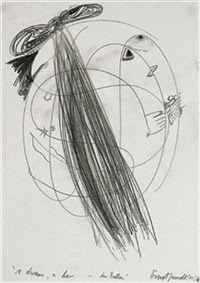In celebration of the great
Lea Goldberg's birthday today, here are two translations, one by me, of a poem she wrote when she was young about the woman who gave birth to her.
 |
| Frederico Zandomeneghi, Mother and Daughter (1879) |
To a picture of mother / Lea Goldberg (My translation)
How your picture is calm — you are different:
Somewhat proud and embarrassed in being — my mother.
Looking on with a tear, with a smile not insistent,
Not one querying “who?” do you utter.
Never wondered, nor vexed, when I came to your door
Day in and day out and demanded: "provide!"
Everything to me in your own arms you bore
Because I was me, and no reason beside.
And today you remember more than I do
My childhood’s sorrow, and your heart did divine:
When the daughter, now grown, comes by to see you
She will bring the despair of her grief in its prime.
Yes. Shattered I’ll come and not ask how you fare,
I won't cry in your lap, won't whisper: my mother!
You will know:
My deserter was dearer to me than you were,
Still no querying “who?” will you utter.
To mother's picture / Lea Goldberg (tr. Zvi Jagendorf, from the wonderful anthology
The Defiant Muse)
Your picture is so peaceful, a different you,
proud and a bit bewildered, you're my mother.
Joining me with a tear, giving in with a smile,
never asking who.
You weren't astonished or angry
when I came each day saying: Give!
You brought me everything with your own hands
just because It was me.
More than I, you remember today
the pain of my childhood, You worked it out:
how your daughter, older now, comes to you
bringing her grown despair and sadness.
Yes this is me, broken, and I'll not ask how you are,
won't cry on your breast, won't whisper mother.
You'll know it:
He's gone who was dearer to me than you,
You won't ask who.
לתמונת אמא / לאה גולדברג
תמוּנָתֵךְ כֹּה שְׁלֵוָה – אַתְּ אַחֶרֶת:
קְצָת גֵּאָה וּנְבוֹכָה עַל שֶׁאַתְּ - אִמִּי.
מְלַוָּה בְּדִמְעָה וּבְחִיוּך מְוַתֶּרֶת
וּמֵעוֹלָם אֵינֵךְ שׁוֹאֶלֶת: "מִי?"
לֹא תָּמַהְתְּ, לֹא רָגַזְתְּ, עֵת בָּאתִי אֵלַיִךְ
מִדֵּי יוֹם בְּיוֹמוֹ וְאָמַרְתִי "תְּנִי!"
אֶת הַכֹּל הֵבֵאת לִי בְּמוֹ יָדַיִךְ
רַק מִפְּנֵי שֶׁאֲנִי – אֲנִי.
וְיוֹתֵר מִמֶנִי אַתְּ הַיוֹם זוֹכֶרֶת
אֶת יְגוֹן-יַלְדוּתִי, וְנַפְשֵךְ כְּבָר פָּתְרָה:
עֵת תָּבוֹא אֵלַיִךְ הַבַּת הַבּוֹגֶרֶת,
הִיא תָּבִיא אֶת יֵאוּש תּוּגָתָה שֶׁבָּגְרָה.
כֵּן. אָבוֹא רְצוּצָה וְלֹא אֶשְׁאַל לִשְׁלוֹמֵךְ.
לֹא אֶבְכֶּה בְּחֵיקֵךְ, לֹא אֶלְחַשׁ: "אִמִּי!"
אַתְּ תֵּדְעִי:
זֶה שֶׁעֲזָבַנִי הָיָה לִי יָקָר מִמֵּךְ
וְלֹא תִשְׁאָלִינִי: "מִי?"











